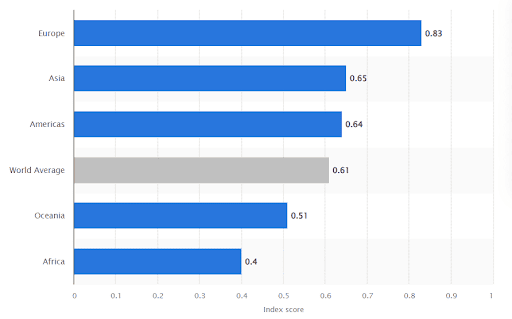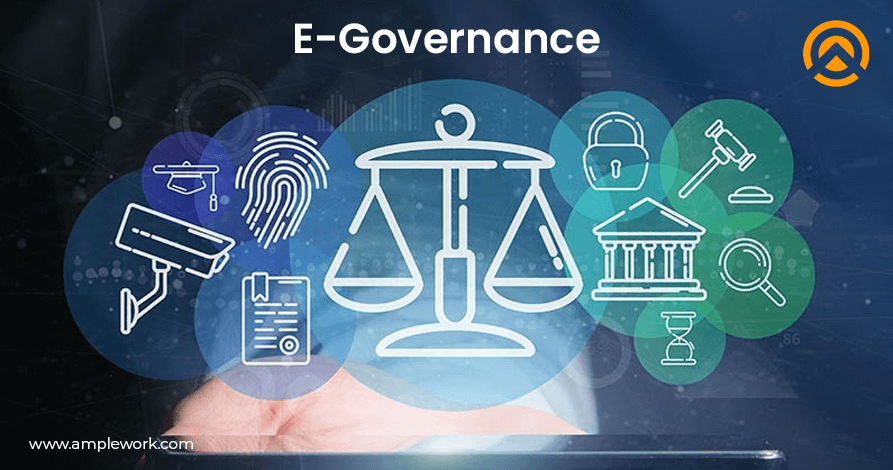E-Government Services: Modernizing Governance with Software
The emergence of technical advancement is everywhere and results in many advancements. The government sector also introduced these technical advancements in the form of Electronic or digital governance. The option of developing E-government services is a revolutionary step. Which brings qualities like efficiency, transparency, and accessibility to public sector practices. Previously, the software development life cycle was only meant to represent private services. Now, we can utilize this innovative technology to shape the future of government as a digital backbone. The management of the public sector has various responsibilities that require the utmost accuracy and responsible handling. The involvement of different software development methodologies can result in effective management of such responsibilities with effective outcomes. The research data by Statista highlights the analysis results in the same context.

The above figure shows the numeric details of the E-government development index (EDGI). Along with the data for individual counties as well as for average criteria on a worldwide scale. According to this, the world holds an average of 0.61 on the index score on the full scale of 1. In this static data, the top position with an index score of 0.83 is taken by Europe for the year 2022. This represents the expanding emergence of E-government technology for providing effective software maintenance and support.
This blog highlights the critical role of software development methodologies in modernizing the public sector. The major highlights of this are the possible ways by which governance can be digitally advanced and the major advantages of making this transformation work. If you are and government official and looking for such information then this blog can help you in many ways.
Possible Ways of Implementing E-Government
Technology holds the potential to reform the existing processes and provide different ease. The integration of digitalization practices within the government sector brings various advantages. Whether these aim to enhance the effectiveness of government work procedures or improve the efficient delivery of E-government services to citizens, you can implement such requirements through the emergence of specific practices. Further explanations follow.
1. Smooth Identification Procedure
The practice of software development holds the capacity to be molded according to the requirement criteria. The development of citizen identity systems is considered the most effective way of developing E-government. In this government officials can look forward to web application development and mobile application development. These ways can effectively represent E-government services and the execution of these services without any problem. This concept of digital identity can provide secure identification, smooth authentication of data, and availability of digital signatures.
2. Mobile Payment
Financial services are assets that are completely interconnected with other working sections of the economy. The practice of software advancement can introduce you to ample possibilities for digital scanning solutions. The digital transformation of government financial resources is the practice of future advancement. The development of digital money transfer has more outreach to the citizens as compared to traditional banking systems. The integration of digital payment can lead to the reduction of corruption criteria with the help of digital and SMS receipts.
3. Information Broadcasting
It is not shocking that the majority of the population has mobile phones instead of having a bank account. Digital advancement can be an effective source for spreading information. Every citizen of a country holds the right to get information and this can be beneficial both. The information can be related to different reasons such as warnings of potential disasters, weather emergencies, droughts, terrorist attacks, and information related to other public services. A mobile app development company can look forward to developing software that enables automated operation of forwarding information.
4. Citizen Engagement
Government services are offered for the welfare of the country’s citizens and the practice of citizen engagement can lead to good government. This engagement can be improved with the help of feedback software or applications. At the current time, many countries are working towards improving their citizen engagement with the help of different feedback portals, SMS approaches for collecting information, and media uploading options for the nearest public service practices.
5. AI Tracing Language to Violence
The development of advanced technology such as Artificial intelligence is increasing the most in the current times. The development of solutions based on AI and its sub-technologies can result in many benefits. One of these advanced solutions is to take control of violence with big data analysis of language used by people. These advanced practices of analysis can be an effective method of unlocking the link between language and acts of violence.
6. E-voting Systems
Electronic voting (e-voting) systems revolutionize electoral processes, ensuring accessibility and inclusivity for all citizens, including those with disabilities and remote voters. They offer convenience by enabling citizens to cast their ballots at their convenience from any location with an internet connection. Robust security features, such as encryption, voter verification, and audit trails, protect the integrity of votes. Public awareness campaigns and pilot programs build trust and understanding. Governments committed to continuous improvement ensure the system’s scalability and adaptability, advancing the efficiency and transparency of the democratic process while upholding democratic values.
7. Online Service Portals
Online service portals are central to modern governance, offering citizens an efficient and user-friendly way to access a range of government services, from tax filing to permit applications. These portals enhance convenience by enabling online submissions and payments, reducing bureaucracy. They act as a one-stop hub for citizens, improving accessibility and saving time. Robust cybersecurity measures safeguard sensitive data, ensuring privacy and trust. Public-private partnerships and cloud computing infrastructure facilitate seamless service delivery. Additionally, data analytics and artificial intelligence enable personalized services and informed decision-making. Such portals promote transparency, improve service quality, and adapt to the digital age’s demands, making government services more accessible and efficient.
Also Read: A Complete Guide for Public Transport Navigation App Development
Advantages of Digitally Advanced Government

The current era is the age of digital transformation and with its implications, every sector is getting the fruits of advancements. This digital practice or software development life cycle within the governance can bring many advantages. These advantages are mentioned further.
Improved access with Digital Advancement
E-government services have broken down barriers to government interaction by offering citizens easy access to essential services. The digital age has ushered in an era of unprecedented convenience, with government services available at the click of a button. No longer bound by geographical constraints or office hours, individuals can access information and complete transactions on their terms, reducing the need for in-person visits and long wait times.
Enhanced Government Efficiency
Digitally advanced government services significantly enhance government efficiency by automating processes, reducing bureaucratic hurdles, and streamlining workflows. This leads to quicker service delivery and a reduction in errors, as well as the optimization of resources, including staff time and financial savings. Moreover, these services foster greater transparency and accountability, making government actions more traceable and discouraging corruption. During emergencies, they prove invaluable for rapid disaster response and coordination among government agencies. In essence, E-government services are a cornerstone of modern governance, simplifying operations, increasing productivity, and promoting good governance.
Improvement in Financial Inclusion
The E-government services also drive significant improvements in financial inclusion. By offering online payment options and facilitating digital transactions, they empower unbanked and underbanked populations to participate in the formal economy. This not only reduces reliance on physical currency but also encourages savings and enhances overall economic stability. The convenience and accessibility of these services ensure that a wider spectrum of citizens can access and participate in financial systems, promoting financial inclusivity and equality. Additionally, the shift towards digital transactions supports the transition to a cashless economy, which has broader economic benefits. In sum, E-government services play a pivotal role in advancing financial inclusion and contributing to broader economic sustainability.
User-Centric Approach
The emergence of digital public services works on prioritizing a user-centric approach, placing citizens at the forefront of their design. These services are crafted with intuitive interfaces and personalized options, catering to diverse needs and preferences. This user-centricity empowers individuals to access government services with ease, fostering inclusivity and accessibility for all. By allowing citizens to customize their interactions, E-government services ensure that government offerings are tailored to individual requirements, enhancing the overall user experience. This approach promotes a more citizen-friendly, responsive, and accommodating government, aligning public services with the evolving expectations of the people they serve, ultimately ensuring that government is by the people, for the people.
Service Improvement
The establishment of advanced digital solutions can result in effective software maintenance and support services. Through feedback mechanisms and data analytics, government agencies can identify areas for enhancement and make necessary adjustments. This commitment to quality and responsiveness ensures that government services evolve to meet the changing needs and expectations of citizens. By constantly refining and updating their offerings, government agencies provide more efficient, effective, and tailored services. The emphasis on service improvement makes interactions with government agencies more convenient and citizen-friendly, ultimately enhancing the overall quality of public services and the satisfaction of those they serve.
Effective Decision Making
By adapting the power of digital technology, these services generate valuable data and insights. The vast amount of data collected through digital channels can be analyzed to refine resource allocation, policy development, and strategic planning. This data-driven approach enables policymakers to make informed, evidence-based decisions, leading to better governance and more targeted initiatives. In essence, E-government services empower governments to harness the wealth of information available in the digital age to drive effective and efficient decision-making, ultimately benefiting both public administration and the citizens it serves.
Cost-effective solutions
With E-government services government operations can be less cost-consuming. By reducing paperwork, automating tasks, and streamlining processes, these services result in significant cost savings. This efficiency is achieved through resource optimization, including staff time, reduced paper and printing costs, and a more judicious use of digital infrastructure. These cost-effective measures contribute to the overall fiscal health of government organizations, allowing resources to be redirected to critical areas. Furthermore, the adoption of E-government services can also minimize the financial burden on citizens, making government services more affordable and accessible. In essence, cost-effective solutions are a hallmark of E-government services, improving financial sustainability and service affordability for both government agencies and the public.
Read more: The Rise of Neo-Banks: How They’re Shaping the Future of Finance
Conclusive Outlines
Digital public service platforms are spearheading the transformation of governance with software solutions that offer cost-effective answers tailored to a wide array of markets. As the demand for these advanced digital platforms continues to surge, the landscape of software-driven governance has witnessed the emergence of visionary developers and forward-thinking organizations dedicated to this innovative craft. In the face of the initial challenges often encountered by pioneers in this field, many have successfully left their mark in the realm of governance innovation. In today’s dynamic landscape, the integration of digital public service platforms with software has become more accessible, empowering governments and organizations to seamlessly adapt to the ever-evolving needs of modern governance.
Amplework stands as a shining example of excellence in this software development field boasting over 5+ years of immersive experience. Our dedicated team consistently exceeds client expectations, building a reputation for unwavering reliability and trustworthiness, and achieving a remarkable revenue milestone of 200 million. Explore our website to discover the exceptional software maintenance and support services we offer for the software development region. Partner with Amplework to embark on a transformative journey toward cutting-edge software solutions that will drive the growth and prosperity of public services.
You May Also Read:- Advancing User Feedback and Market Demand


 sales@amplework.com
sales@amplework.com
 (+91) 9636-962-228
(+91) 9636-962-228





